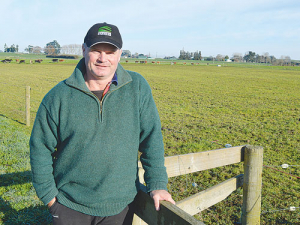New Waikato Federated Farmers president Andrew McGiven is pushing for a united front to tackle water issues confronting the region.
The Te Aroha dairy farmer says Feds aims to get the best outcome for the rural sector under the Waikato Regional Council’s Healthy Rivers/Wai Ora proposed plan change 1. The council aims to improve water quality in the Waikato and Waipa river catchments.
Waikato Feds has at least 2000 members in dairy, sheep and beef, horticulture and forestry.
McGiven says he wants a “Waikato Inc” approach so that small rural towns reliant on agriculture also get to have their say.
The first round of submissions closed in March this year and the plan still needs to go through hearings towards final decisions scheduled for next year.
McGiven says his plan is to pull together the agriculture industry and the rural sector.
“We are divided at the moment; we need a pan-sector approach from forestry through to horticulture, to understand what each sector’s submission is about and find common ground.
“I don’t expect every submission to be same but core drivers of each industry would be similar when it comes to water and water quality.”
McGiven says farmers will work with territorial authorities, and scientists to further improve water quality in the hope that rules won’t be imposed.
“As in the dairy industry, where we have done lots of fencing and riparian planting of waterways… [we need to] find the same type of solutions for sheep and beef farmers, but they may be completely different approaches in order to achieve the same vision and goals.”
The Waikato Regional Council last month mailed brochures to 10,000 landowners in the catchment, outlining the plan’s key components and suggesting priorities for landowners’ thinking, to set them up for the time when final decisions are made.
Those priorities include:
• Registering all properties over 2ha in the Waikato and Waipā river catchments by March 31, 2019
• Providing a nitrogen reference point (NRP) by March 31, 2019. This will affect most properties over 20ha and commercial vegetable growers. Landowners who now keep good records may find it cheaper to prepare this information
• Creating a farm environment plan (FEP). This will affect most properties farming over 20ha. FEPs are tailored to identify and manage the four key contaminants -- nitrogen, phosphorus, sediment and bacteria -- on a property, setting out specific timeframes for work to be done.



















